Anyone familiar with SEO (search engine optimization) knows that it typically takes some time to see the fruit of your labors.
Google itself says “SEOs need four months to a year to help your business first implement improvements and then see potential benefits.” Many variables come into play to affect this timeline, including:
- Keyword competitiveness
- Website age, health, and SEO value
- The effectiveness and aggressiveness of the SEO strategy
When all the stars align just right, it’s possible to see meaningful movements in page rankings in rapid time– even, in rare cases, overnight.
That’s what happened for our client Beach Break Surf Camp, who we managed to move from the 100+ result for a keyword to the 6th result– less than 24 hours after updating their website content– through our SEO content writing services.
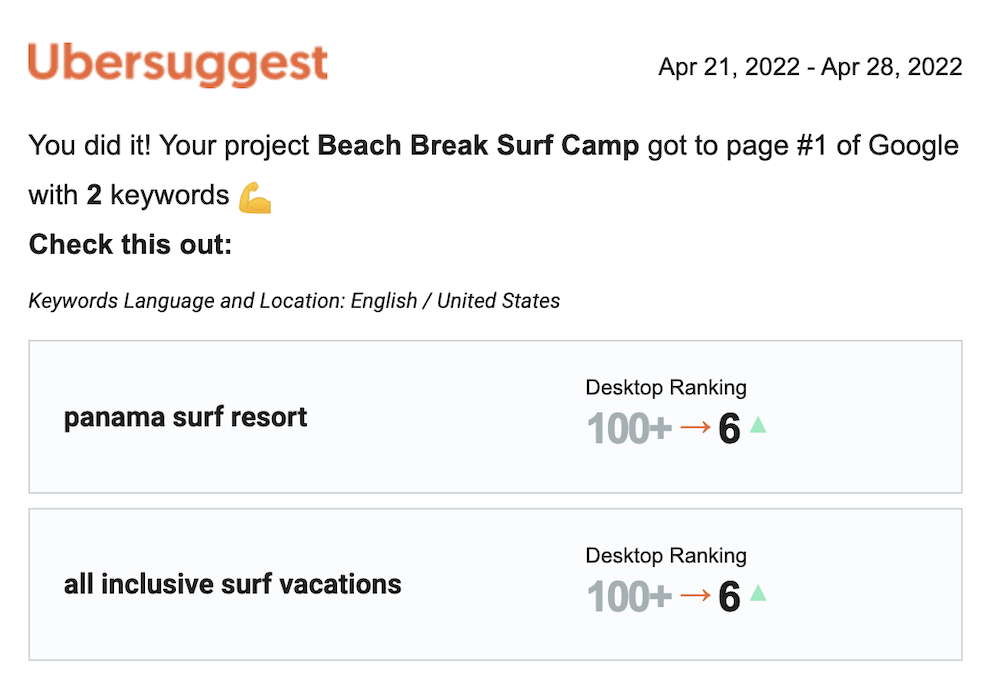
We managed to do this both for a brand-new keyword– all inclusive surf vacations as well as an older keyword they had dropped in the rankings for– panama surf resort.
Here’s how we did it.
Step 1: Strengthen SEO foundation through monthly content services
While this step didn’t happen overnight, it did build a strong SEO foundation that helped to accelerate the client’s progress when ranking for new keywords.
Beach Break Surf Camp uses our monthly SEO content writing services– receiving two SEO-driven blog posts each month that are researched, written, designed, and published directly to their website.
Each month, we decide what blog post topics to cover based on both keyword research and the evolving needs of the client.
For example, one month we published “Why Older Surfers are the Best Surfers” – targeting both the keyword “older surfers” and speaking to one of the client’s target audience segments. We also published “Top Reasons to Rent a Surf House” – targeting the keyword “rent a surf house” and promoting the client’s new luxury surf house rental.
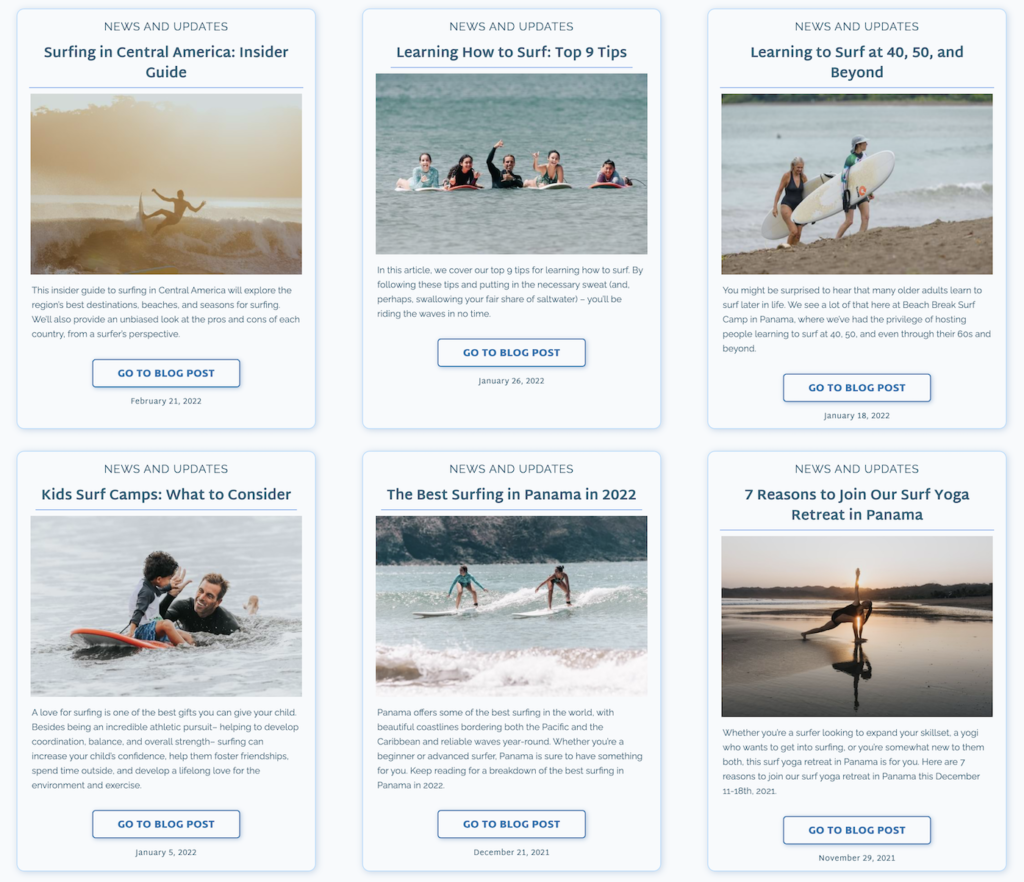
Over time, these blog posts strengthen the website’s SEO value, while simultaneously attracting relevant website traffic, promoting client offerings, and giving the client high-quality content to share over their social media channel (thereby attracting additional website traffic).
While these blog posts didn’t play a direct role in boosting page rankings for the all-new keywords, they did give the client’s website a strong SEO foundation that accelerated their ability to rank quickly for new and relevant keywords
Step 2: Research and identify high-opportunity keywords
As part of our monthly blogging package, we are always tracking the client’s page ranking for relevant keywords and keeping an eye out for new, high-opportunity keywords worth pursuing.
A high-opportunity keyword is one that has:
- Relatively high search volume– enough people are searching the keyword each month to make the keyword worth pursuing
- Relatively low competition– there aren’t as many other websites competing for the same keyword, making it easier to rank for it
- Relevant to the client’s offerings and audience– the keyword is likely to attract website visitors who are in the target audience and/or likely to be interested in the client’s offerings
Why Relative?
We use the word relative here because it is all, truly, relative. A keyword that receives ~200 searches per month isn’t necessarily ‘highly searched’– but if that keyword is directly tied to a clients’ products or services, those ~200 searches per month could turn into meaningful business.
Similarly, the competitiveness of a keyword is relative to the clients’ resources and current standing in that market. Ranking for a high-competition keyword like Florida real estate will be next to impossible for a small or newer company. A larger company with more resources and more historical time in the market will have a much better chance.
In this instance, we identified all inclusive surf resort and all inclusive surf vacations as high-opportunity keywords for Beach Break, based on the following criteria:
- The client had recently shifted their business model to focus on all-inclusive vacation packages rather than stand-alone hotel bookings.
- All inclusive surf resort also had the relatively high search volume of 140 searchers per month, and relatively low competition. Since the client runs a moderate-sized boutique hotel, sending 140 relevant visitors to the website is a huge win!
During our research, we also noticed one of the client’s main keywords, Panama Surf Resort, had dropped in the rankings following a recent website update. We brought this to the client’s attention and he agreed – we wanted to get that ranking back up!
Step three: Rewrite key website pages to target identified keywords
Once we identified our target keywords and which website pages would be best suited to target them, we got to work rewriting the content for those pages.
We started with the homepage, which was an ideal candidate to reclaim the keyword Panama Surf Resort. As this was the more general of the two keywords– and it aptly described what the business offered– it made sense to target it through the homepage.
We rewrote the homepage top-to-bottom, taking care to insert the keyword and its variations into the page’s:
- Headings
- Subheadings
- Body text
- Image alt text
At the same time, we were careful not to overstuff the page with keywords, which can have an adverse effect on both SEO and user experience. We also needed to avoid harming the ranking for a Panama Surf Camp, another high-value keyword for which Beach Break held the top position in search.
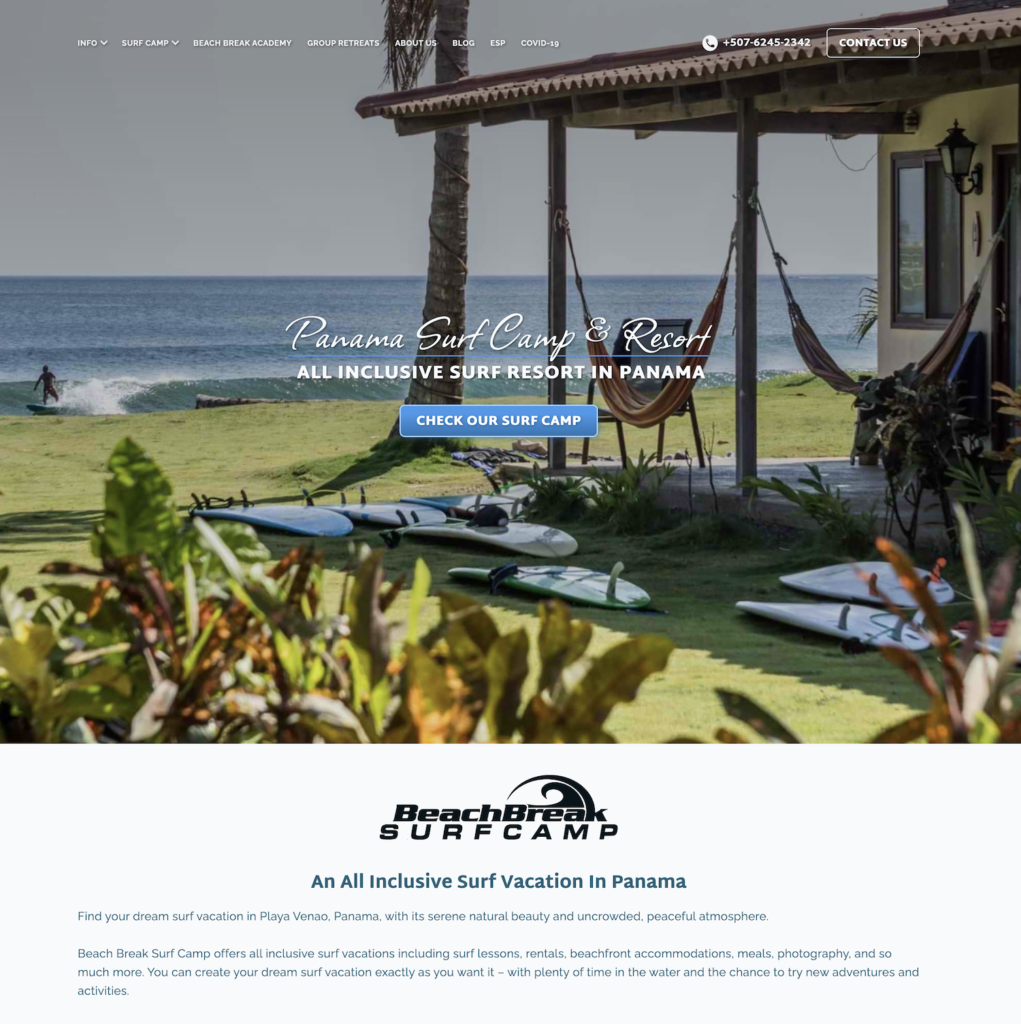
This was also a great opportunity to spice up some of the copywriting on the homepage, painting a compelling picture of Beach Break Surf Camp and its many virtues.
Next, we moved onto the main services page– previously titled “Our Surf Camp”– and rewrote the page to target the keywords all-inclusive surf resort and all inclusive surf vacations. We repeated the steps we took on the homepage, strategically inserting the keyword throughout the page while also improving the overall page content.
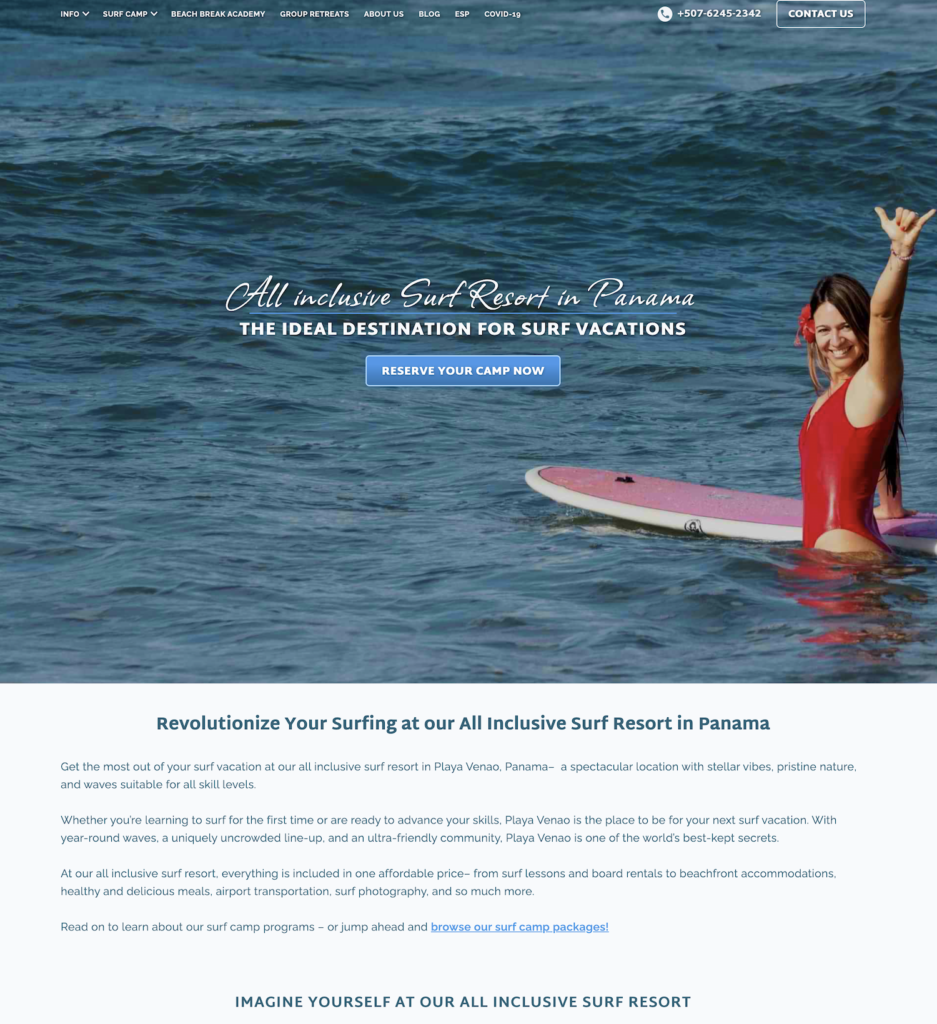
The Results
As mentioned, changes to page rank typically takes weeks, if not months, to kick in. Google simply needs time to recrawl website content and make changes.
You can imagine our pleasant surprise, then, when we received an email from Ubersuggest (our SEO tool) the very next day, informing us that both keywords had skyrocketed to the very first page of Google, claiming the sixth search result.
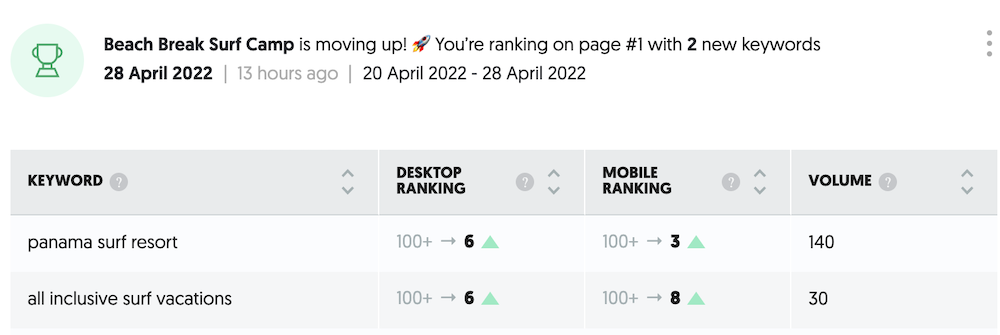
At the time of this writing– roughly one week after implementing the changes– Panama surf resort moved up an additional 3 places and now claims the #2 spot in search results. A variation for the keyword, Panama surf camp, moved to claim the #1 spot.
It’s worth noting– these are the rankings for U.S.–based searches. The page ranking for keywords searched from the country of Panama are even higher. As the client wanted to increase international bookings, we focused our efforts accordingly.


What’s Next? Getting on Google’s First Page for Other Keywords!
As you can imagine, the client was thrilled with these results. We have since moved on to identify and target additional keywords, rewriting website content and/or publishing new blog posts around these search terms.
Here are just some of the keywords we’ve increased page rankings for over the last 30 days, that we will continue to work to increase further:
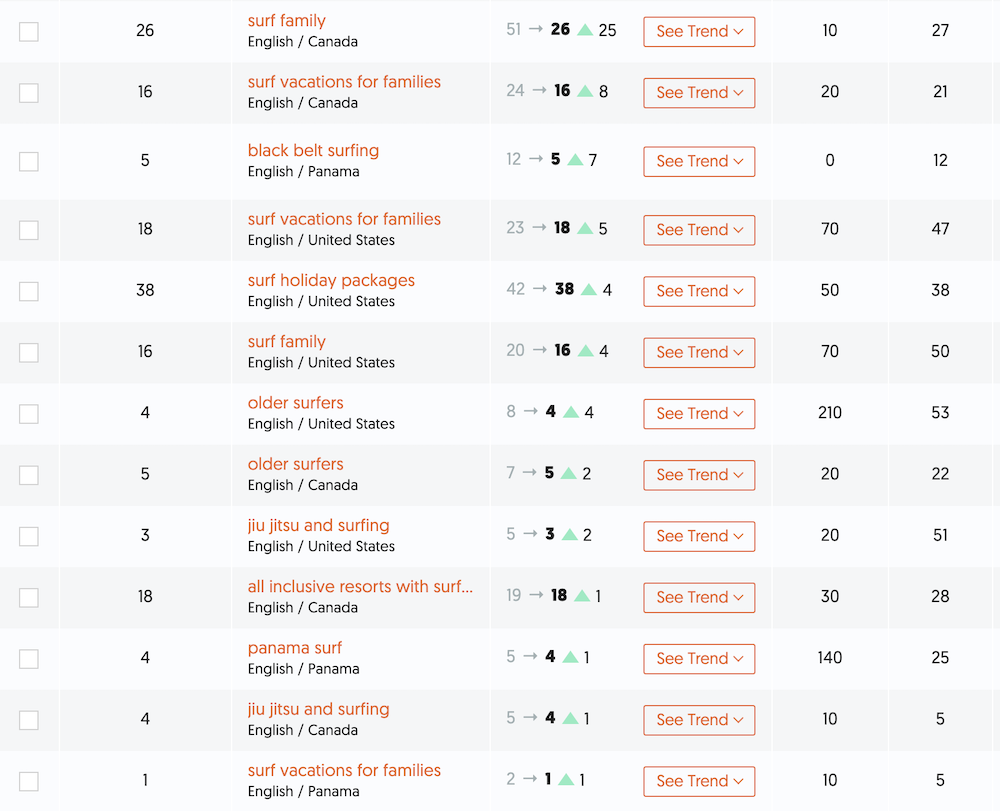
Search engine optimization is an ongoing effort, not a one-and-done game. While we saw great success in increasing the page ranking for these keywords, we’ll need to continue publishing new content and updating older content to maintain our standing in Google search results.
You may also have notice that there are many variations of similar keywords– for example, all inclusive surf resort vs. all inclusive surf vacations. While it’s common for a website to rank similarly for keyword variations, rankings between variations can always vary. Thus, it’s important that an SEO strategy is both holistic while also considering each keyword varation.
How to Get on Google’s First Page
If you’re wondering how to get on Google first page for your own business, we can help.
Getting on the first page of Google isn’t (normally) an overnight process, but with the right strategy you can increase your page ranking for targeted keywords and drive more organic, relevant website traffic for your business.
Check out our SEO Content Writing Services, or book a consultation call to learn how to get on the first page of Google search results.

 hire us
hire us